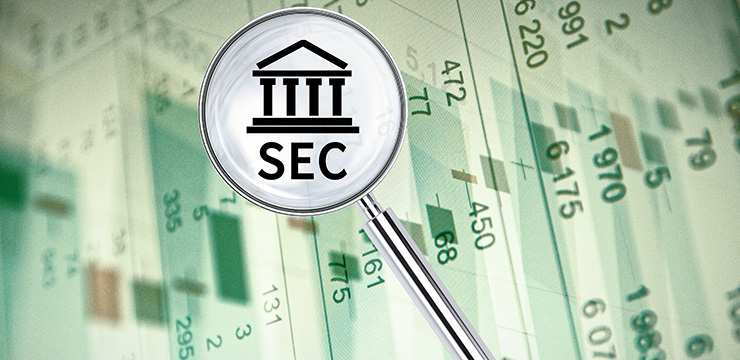What to look out for in the proposed new Chapter 12 of the Uniform Commercial Code (UCC)
The world of cryptocurrencies and other forms of digital assets (such as non-fungible tokens) is exploding. While Bitcoin is the largest and best-known cryptocurrency in the global economy, it is far from the only one. The combined total value of Bitcoin, Litecoin, Monero, Ethereum, and all the other significant cryptocurrencies exceeds $2.4 trillion. In 2021, El Salvador enacted legislation to recognize Bitcoin as a medium of exchange. Other countries are also considering adopting similar legislation. Some countries even contemplate adopting their own blockchain-based currency as a form of legal tender.
Questions have emerged among regulators and market participants whether Bitcoin and other cryptocurrencies constitute “money” and how to perfect a security interest in such virtual currency (to ensure that it can’t be claimed by another party). Other questions relate to how interests in cryptocurrencies, NFTs, and other digital assets can be transferred or monetized and how purchasers of digital assets can be protected from adverse claims.
2022 will bring major changes to commercial law in a sweeping mission to answer some of these questions and to facilitate transactions in these emerging technologies. The proposed new Chapter 12 of the UCC will govern essentially any transfer (whether intended as a sale or a financing) of virtual currencies, NFTs, and other digital assets. These provisions will affect cryptocurrency startups and companies as they purchase and sell cryptocurrency, as well as financial institutions and fintech companies interested in financing cryptoassets and investment banks underwriting issuances of securities underpinned by crypto assets.
2021 and Earlier
By current definition, Bitcoin is not money because it is not a medium of exchange created, authorized, or adopted by a domestic or foreign government, or by an intergovernmental organization or by an agreement between two or more countries. Moreover, since Bitcoin, NFTs, and other digital assets are intangible and therefore not capable of possession, under the UCC as it is currently in effect, a security interest in them can currently only be perfected (as a general intangible) by the filing of a financing statement describing the digital asset. Under the UCC as it is currently in effect, it is uncertain that control of the digital wallet for a digital asset is sufficient to perfect a security interest.
Nevertheless, some practitioners have proposed a practical “workaround” to perfect a security interest in Bitcoin by “control” if the Bitcoin is held in a “securities account,” and the secured party has control over the financial assets (including the Bitcoin) held in the securities account. In this manner, a secured party will have control if the secured party, the debtor, and a securities intermediary (holding the account in which the Bitcoin is held) enter into an agreement in which the securities intermediary agrees to comply with the instructions originated by the secured party directing disposition of the funds and other property in the account without consent by the debtor. The securities intermediary must be a person, including a financial institution, custodian, or broker that in the ordinary course of its business maintains securities accounts for others and is acting in that capacity. The workaround provides the secured party with the amount of control that, as a practical matter, it would need to foreclose upon, and exercise its remedies with regard to the digital asset, but that control itself would not necessarily perfect the secured party’s security interest in the digital asset under the current UCC.
What is New
The proposed new Chapter 12 to the UCC will:
- address the transfer of digital assets/virtual currencies and also provide conforming changes to Article 9 of the UCC to address secured transactions in these assets
- Chapter 12 is designed to govern the transfer (both outright and for security) of interests in some, but not all, electronic records (adopting a new term “controllable electronic records”) (e.g., Bitcoin/NFTs)
- facilitate secured lending against digital assets (e.g., virtual currency, NFTs, and electronic fiat money (i.e., central bank digital currency))
- provide protections for certain qualifying purchasers to take interests in virtual currency and digital assets free of conflicting property claims
- provide rules regarding the assignment of controllable accounts and controllable payment intangibles
- provide other changes including updates to the definition of chattel paper and revisions to the requirements for the transfer and perfection of security interest in chattel paper, and revisions to some rules regarding negotiable instruments and payment systems
How Will These Changes Affect Different Players in the Industry
Blockchain and Cryptocurrency Startups
Chapter 12 will impact blockchain and cryptocurrency startups and companies involved in purchasing, selling, and financing virtual currencies, NFTs, and other digital assets. Chapter 12 will govern the transfer of property rights in intangible digital assets (defined as “controllable electronic records”) that can be subjected to control. Control is the functional equivalent of “possession” of the digital asset. Companies are currently using digital assets in exchange for payment, rights to receive services, for goods or interests in personal or real property. Chapter 12 will reduce the risks among claimants to, and specify the rights in, the digital assets that the purchaser acquires and to facilitate these transactions.
Financial Institutions
Financial institutions, banks, and other lenders who finance virtual currencies and other digital assets will find it easier to arrange secured lending transactions under Chapter 12 (and conforming changes under UCC Chapter 9). A lender will have a perfected security interest if the lender has “control” over the digital asset (or the system on which the digital asset is recorded). In addition, financial institutions, lenders, and other secured parties should consider amending existing security documents. Many existing revolving credit facilities are secured by blanket or broad liens on substantially all assets of the debtor, including its general intangibles. Lenders may want to amend their security documents to provide for a security interest in virtual currencies and other digital assets to provide (a) an express grant of a security interest in “controllable electronic records”, “controllable accounts” and “controllable payment intangibles” and (b) for the lenders to obtain control over controllable electronic records, controllable accounts, and controllable payment intangibles. The amendment will mitigate the risk that the lender will lose its priority position if another party obtains control over the controllable electronic records, controllable accounts and controllable payment intangibles, and the lender has only perfected by filing a financing statement.
Investment Banks
Many securities are issued secured by rights to payment arising from the sale of amounts due under credit cards, accounts, instruments, student loans, and other lines of credit. Underwriters and investors in structured finance and securitization transactions involved in assignment of accounts and payment intangibles will want to review the Chapter 12 provisions regarding the payment obligations and conditions for discharge of obligors on digital assets (controllable accounts and controllable payment obligations). Underwriters and investors should also review the ability under Chapter 12 of a purchaser to acquire special protection as a good faith purchaser for value (a qualifying purchaser) of a controllable electronic record, controllable account and controllable payment intangible.
Parties in Equipment Finance/Lease Transactions
Parties involved in equipment finance/lease finance transactions, underwriters and investors (such as auto finance and auto securitization transactions) will want to review the other proposed changes to UCC Article 9, including the proposed changes to chattel paper. For example, the definition has been amended to provide that chattel paper is a monetary obligation that is either secured by specific goods (such as a car or furniture) or arises in connection with a lease of specific goods (such as a car or furniture). The rule regarding perfection of a security interest in chattel paper has also been revised. Under the old rule—if you had tangible chattel paper (evidenced by writing), the secured party was required to have possession of the writing, and there was confusion if there were multiple copies or what constituted a writing. If electronic chattel paper, the secured party was required to have control of the single authoritative copy, and there was confusion of what it meant to have a single authoritative copy. Under the new rule, the secured party:
- Can perfect its security interest by taking possession of all tangible authoritative copies and obtaining control of all electronic authoritative copies.
- The secured party can produce the copies in its possession and provide evidence that these are the authoritative copies.
- Need not prove that no other tangible authoritative copies exist.
- For electronic chattel paper, the secured party must:
- be able to identify each electronic copy of electronic chattel paper as authoritative or nonauthoritative,
- identify the secured party as the assignee of each authoritative copy,
- have the exclusive power to prevent others from adding or changing an identified assignee and to transfer control of the authoritative copies.
What’s Excluded
UCC Chapter 12 is limited in scope—it only applies to controllable electronic records (i.e., a virtual currency and other digital asset) and payment rights that are evidenced by a controllable electronic record. Chapter 12 does not address a number of federal, state, and local laws and regulatory issues that will undoubtedly interplay with these emerging technologies, including anticipated new regulations from regulators like the SEC, OCC, and the IRS. These laws and regulations are rapidly changing. We will be providing periodic updates.
Also Excluded:
- Who has title to or rights in the digital assets
- Federal and state securities, data privacy, cybersecurity, and other regulation
- Banking laws
- Taxation of digital assets
- Anti-money laundering laws
- Transferable records under UETA or E-SIGN
Schedule for Approval of Changes
| Date |
Event |
| January 2022 |
Drafting committee submits draft proposed recommendations to ALI counsel |
| May 2022 |
ALI approval of draft proposed recommendations |
| July 2022 |
Uniform Law Commission approves proposed recommendations |
| Post-July 2022 |
Submission to states for adoption of proposed recommendations |
Industry Comments
The drafting committee of Chapter 12 and the conforming changes to the other changes to the UCC are in the process of meeting with industry groups and other stakeholders to continue advising industry leaders and other stakeholders regarding these proposed changes. The drafting committee is continuing to work on finalizing the proposed recommendations prior to the May 2022 meeting. We would be happy to meet with you to discuss any comments or concerns that you may have with the proposed changes.




